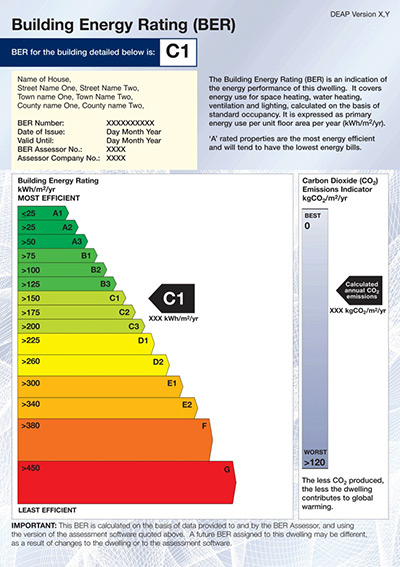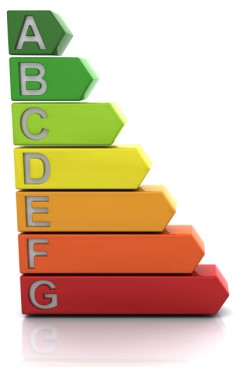BERs — Frequently Asked Questions
What is a BER certificate and do I need one?
BER stands for Building Energy Rating and a BER certificate is a label that tells you about the energy efficiency of a building. BERs are a standardized way of rating and comparing the energy performance of different buildings so they allow prospective homebuyers or tenants to judge the likely running costs of a property and easily compare one property to another. A BER certififcate is only issued after a building has been surveyed by a qualified assessor; the building is then rated on an energy efficiency scale ranging from A, the most efficient, to G, the least efficient.
If you're selling or letting property in Ireland then yes, you do need a BER certificate. BERs have been mandatory under Irish law since 2009. Even if you're not selling or letting your property, however, you can still benefit from a BER energy audit. Every BER certificate is accompanied by an Advisory Report detailing ways you can improve the energy efficiency of your property — knowledge of your energy performance combined with professional, independent advice from your expert assessor can help you cut substantial amounts from your energy costs.
How is my property's BER rating calculated?
Your property is first surveyed by a qualified assessor who will analyse the fabric and heating supply of the building. The results of this survey are then entered in a computer program which calculates its official standardised energy rating.
Two main factors are considered when calculating a building's energy rating — the fabric of the building (known as the Heating Demand), and the nature and condition of the building's heating system (know as the Heating Supply). These two factors, along with climate data, are used to calculate a standardised efficiency rating which allows the energy performance of different buildings to be easily compared.
Note that you may be able to substantially improve the energy rating of your property by taking simple energy-saving measures. Your BER assessor will advise you on how to improve your rating.
How long will the BER be valid?
A BER certificate is valid for 10 years from its date of issue, provided there have been no major changes to the property that would substantially alter its energy performance. The kind of changes that would require a new BER certificate might include such things as adding an extension to the property or changing its heating system.
What does a BER certificate look like?
You can see a sample BER certificate below. Clicking this image or this link will allow you to download a larger annotated version in PDF format.
How much can I expect to pay?
The cost of a BER survey varies depending on the size and type of the property. For a free quotation specific to your property you can contact Robert by phone or email. You will be quoted a full 'all in' price before any suvey work is carried out and there are no hidden charges.
How can I improve my energy rating?
A building's energy rating is not set in stone. In many cases it can be improved significantly by simple measures like adding extra insulation, replacing old, inefficient heating systems or installing solar panels. As part of your BER survey you will receive comprehensive advice on improving your energy rating and reducing your energy bills.
A BER energy audit from Louth BER will identify the most cost-effective energy-saving measures suitable for your home and our assessor will support you in making informed decisions. All the advice we give is totally impartial and does not involve the selling or endorsement of any particular products or services.
You should note that a number of government grants are available for homeowners interested in improving the energy efficiency of their homes. As part of your survey you will receive advice on any grants available to you and assistance in making grant applications.


